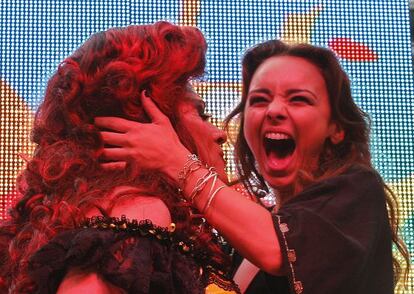Madrid welcomes Gay Pride
This year's program features a smorgasbord of protests, parties, shows and other events. But what's the meaning behind all of the festivities?

The sweltering heat didn't discourage the exuberant crowd congregated in the heart of Chueca, who, below a canopy of rainbow flags, celebrated the commencement of Madrid's Gay Pride Week on Wednesday night.
This year's program (which continues through Sunday) is promising a wide array of parties, shows and events to celebrate the Lesbian, gay, bisexual and transsexual (LGBT) community. But between the political pamphlets, drag shows, pool parties and art exhibits, it's easy to lose track of what Madrid Pride (colloquially known as MADO) really means. It begs the question: is Pride Week a political protest, a cultural celebration, or just an excuse to get drunk? Perhaps all three.
First and foremost, Pride Week pitches itself as an opportunity for participants to celebrate who they are and the rights that they have. The event - which attracted over two million participants last year - puts the emphasis on inclusivity. Most events are open to people of all ages and sexual orientations; Pride is not, as its organizers emphasize, just for gay people.
On Wednesday, festivities kicked off with an opening ceremony in Chueca plaza that featured a performance by singer Paloma San Basilio. The Spanish songstress, who has a Latin American Grammy award to her name, gave a concert featuring work from her latest album.
Madrid currently has over 500 businesses geared toward the LGBT community
Additionally, MADO presents a forum for creative expression of identity. In keeping with the theme of gay pride, a number of local theater groups and art galleries are showcasing LGBT-themed exhibitions and shows. For example, the Teatro del Arte is putting on a show of humorous lesbian-themed monologues, written by young but established local actresses.
Naturally, the festivities also have a political undertone. The focal point of Pride Week's activism is the public march set to take place on Saturday. Half-political protest, half-street party, the event organizers anticipate that the march will attract more than a million attendees.
This year, the march is following a new route: it will begin in Atocha, continue along the Paseo del Prado and end at the Puerta de Alcalá with a reading of the movement's collective manifesto. This year's theme is "Youth without closets." MADO also presents an opportunity for artists - both local and international - to spread a political or social message. For example, the Triangle Foundation has organized a photography exhibition entitled Africa's Gay Too . The works depict the social reality of homosexuals living in Africa and highlights human rights violations.
Gay Pride week wouldn't be complete without an ample entertainment agenda that encompasses the bizarre, the kitsch and the otherwise outrageous, such as the opening night's David Bowie tribute - which included a look-a-like contest with a 1,000-euro prize. In addition to games and contests, the program also includes a number of sexually charged and outlandish fiestas. For example, Friday's "We Pool Party" at Casa De Campo is set to be an old-school pool party with a twist, promising to be the highlight of the week for fans of electronic music and wet t-shirts (or lack thereof).
Many Madrid nightclubs are organizing live entertainment shows, while other venues are taking kitsch to a new level. The 'Que Trabaje Rita' festival (Sunday evening in Charada Club) will offer drag shows and other live performances. Other establishments are tailoring their parties to specific sectors of the LGBT community - from bears to 20-something lesbians and everything in between.
And even when this week's festivities come to a close, this doesn't mean that gay pride will be extinguished. On the contrary, Madrid has a vibrant LGBT scene year round. There are currently 500 businesses geared toward the LGBT community, covering bars, restaurants, nightclubs, stores, gyms, hotels and more. While many are located in Chueca, the epicenter of the scene others are not. Indeed, LGBT life is diffusing into other neighborhoods as Madrid (and Spain in general) becomes increasingly gay-friendly.
Perhaps this is why the Spanish capital is gaining international recognition as a bulwark of gay rights. Madrid even made a successful bid to host World Pride in 2017, elected unanimously by the InterPride assembly last fall. Gay rights have gained an astounding amount of momentum in relatively little time. Since the 1980s, MADO has evolved from a small protest spearheaded by a handful of so-called radicals to the massive and celebratory demonstration it's become today.
Indeed, Madrid Pride has become too multidimensional to classify; it's hard to pinpoint exactly what MADO means. For now, it appears to be a combination of protests, drinking games and highbrow culture, all rolled up into a community-wide celebration of diversity. What it will mean five or 10 years from now remains to be seen. But one thing is for sure: the party's just getting started.
Tu suscripción se está usando en otro dispositivo
¿Quieres añadir otro usuario a tu suscripción?
Si continúas leyendo en este dispositivo, no se podrá leer en el otro.
FlechaTu suscripción se está usando en otro dispositivo y solo puedes acceder a EL PAÍS desde un dispositivo a la vez.
Si quieres compartir tu cuenta, cambia tu suscripción a la modalidad Premium, así podrás añadir otro usuario. Cada uno accederá con su propia cuenta de email, lo que os permitirá personalizar vuestra experiencia en EL PAÍS.
¿Tienes una suscripción de empresa? Accede aquí para contratar más cuentas.
En el caso de no saber quién está usando tu cuenta, te recomendamos cambiar tu contraseña aquí.
Si decides continuar compartiendo tu cuenta, este mensaje se mostrará en tu dispositivo y en el de la otra persona que está usando tu cuenta de forma indefinida, afectando a tu experiencia de lectura. Puedes consultar aquí los términos y condiciones de la suscripción digital.








































